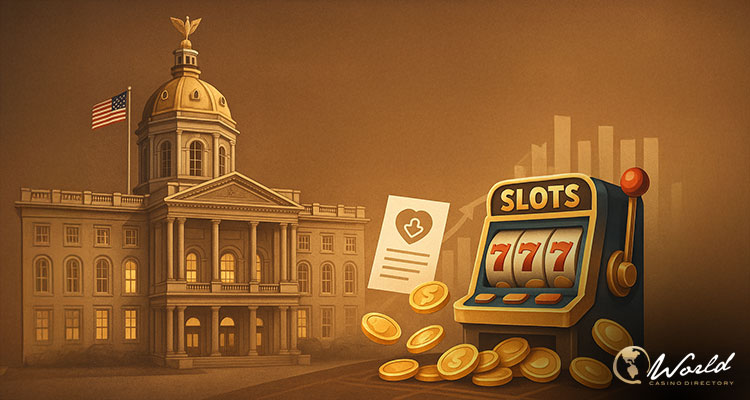New Hampshire legislators are reevaluating the state’s charitable gaming structure as discussions intensify around a proposal to introduce traditional slot machines in place of historical horse racing (HHR) terminals. A recent tour of The Nash Casino in Nashua offered lawmakers a firsthand look at how these gaming venues operate and raised new questions about fairness in charitable distribution, the pace of gaming expansion, and the social impact of gambling.
Balancing revenue growth with fairness for nonprofits:
The visit coincides with a set of legislative measures under consideration this session, including bills that would greenlight video lottery terminals—commonly recognized as slot machines—or place limits on the amounts casinos can donate to individual charities. These proposals are part of Governor Kelly Ayotte’s broader budget plan aimed at increasing both state revenue and charitable contributions through expanded gaming options.
Rep. Thomas Schamberg, a Democrat from Wilmot, expressed cautious optimism following the tour, noting The Nash Casino appears to reflect “the right philosophical approach.” However, he emphasized the need to ensure equitable treatment for smaller nonprofits that have yet to benefit from the casino donation schedule. “We’re trying to take care of our less fortunate and our nonprofits in this state,” Schamberg said.
Currently, around 800 charities receive funds annually through New Hampshire’s charitable gaming model, but many organizations have not yet had a chance to participate. Existing rules allow up to two nonprofits to benefit from casino activities per day, with 35% of gross gaming revenue from HHR machines and table games allocated to charitable causes. The state receives 25%, and casinos retain the remaining 40%.
The Revo Casino network, owned and operated by New Hampshire Group, LLC (NHG), which is a subsidiary of Peninsula Pacific Entertainment (P2E), comprises locations in Manchester, Keene, Dover, Conway, and Lebanon. The charitable gaming facilities distributed over $15 million to approximately 400 nonprofits last year. Revo also provides an online application system for charities seeking inclusion in the donation rotation.
Governor Ayotte’s proposal argues that replacing HHR machines with traditional slot machines, which spin about five seconds faster and cost less to operate, could substantially increase revenue. Projections suggest this change could yield $70 million more for charities and $128 million in total state revenue by the second budget cycle.
Caution around expansion and social impact:
Rep. Mary Murphy of Francestown supports the proposal in principle but stressed a measured approach to expanded gambling. “If HHR was going to cause a problem, slot machines would probably have the same effect. But it’s a win-win for the state and for charities,” Murphy stated. Still, she made clear that growing local businesses would be her preferred route to boosting state income.
Slot machines and HHR terminals appear nearly identical to casual players, though their internal mechanisms differ. The real impact, Murphy argued, lies in the broader social implications. “We’re not in support of revenue at the expense of creating a bunch of social problems for the state,” she said.
Concerns around problem gambling have intensified as calls to the New Hampshire Council on Problem Gambling continue to rise. In 2021, the council received 205 inquiries. That number climbed to 306 in 2023 and then to 439 in 2024. Lawmakers say the current $250,000 allocation for problem gambling support is insufficient, especially as the industry expands.
In March 2025 alone, charitable gaming reportedly generated significant returns: the state collected $5.3 million, charities received $5.7 million, and casino operators netted $25.6 million, per the New Hampshire Lottery Commission.
Demographic gaps and legislative outlook:
Despite growing interest in charitable gaming, the state has not conducted a formal study on who frequents New Hampshire’s casinos. Lawmakers voiced a desire to learn more about visitor demographics, but such data is currently not collected.
Jane Goodman, executive director of the Nashua Soup Kitchen & Shelter, highlighted how impactful these charitable contributions can be. “It’s an amazing thing to get a check from charitable gaming and to say, ‘Maybe we can supplement our food this week.’”
While interest in casino expansion is growing, online casino legalization has hit a roadblock. Senate Bill 168, introduced by Sen. Tim Lang and other Republicans, proposed between three to six iGaming licenses and a 45% tax rate benefiting vulnerable groups. However, the bill was ultimately defeated in the Senate Ways and Means Committee.
House Ways and Means Chair John Janigian emphasized the need for continuous review of the charitable gaming industry. “It’s a whole new ballgame,” said Janigian, as reported by the Concord Monitor. “We need to make sure we’re making decisions that make sense.”



